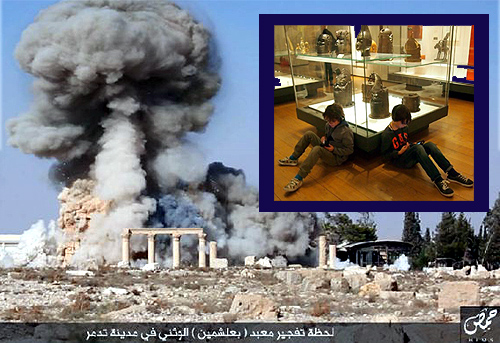 Should the obelisk and Rosetta Stone in France be returned to Egypt? Should tens of thousands of artifacts held in western museums be returned to their origin?
Should the obelisk and Rosetta Stone in France be returned to Egypt? Should tens of thousands of artifacts held in western museums be returned to their origin?
The debate is not new but acquired a new edge recently with a proposed new German law and with the upcoming ten-year birthday celebration of Paris’ Musée du quai Branly.
The relatively new Parisian museum was an amalgamation of two older museums in order to consolidate the city’s most precious African artifacts. But according to critics:
“Westerners and their museums seem very keen to tell the history of Africans but they do not seem to understand … that Africans might also want to tell their own history,” explains African artifact expert, Kwame Opuko.
The point is how can Malians tell the story of Timbuktu when it’s under a threat of destruction by terrorists?
Germany is reconsidering its law to tighten ownership of foreign artifacts after a Chilean who had acquired a massive collection of African artifacts slipped into the country to avoid prosecution from authorities at home … with his collection … and then slipped out before the Germans could decide what to do about it.
It’s not clear yet whether Mr. Patterson did anything illegal. But his accumulation of rare artifacts (particularly from Benin) and his popping in and out of a variety of countries to avoid possible prosecution has opened wide the conversation whether it’s ethical to hold any foreign artifacts outside their place of origin.
No, says Yale University. Yes, says the British Museum.
This is a question that really taxes the intellect and it’s particularly timely with the trouble in Syria and Mali.
The Timbuktu library holds the largest collection of very early African manuscripts in the world. Remarkable efforts by people who lived there saved many of them from the destruction ordered during the recent brief occupation of radical Islamists.
But many probably were lost, and had that single hero not intervened all would have been lost. Timbuktu and most of Mali was “liberated” from this 21st century occupation by the French, and the argument continues in France whether the treasures of Mali should be exported there, now.
We see the wanton destruction to many of Syria’s ancient ruins. It seems to me this is example enough that Mideast treasures in the British Museum should stay right where they are.
But once Syria is peaceful, again, should they be returned?
Who will decide that “Syria is peaceful, again”? How long a period of peace is required? Is autocratic peace or dictatorial peace … peace enough?
When it gets down to it, are we just saying that only the west is capable of making this judgement? Might not Donald Trump or a new Adolf Hitler fund their infrastructures with looted artifacts from Mexico or France just as ISIS is doing now?
I believe very strongly that artifact preservation is essential to understanding ourselves. It applies mostly to our evolution but when understood in the context of the time it was created, social insights crucial to our long-term survival may become evident.
Something of this importance can’t be left to chance survival. Artifacts should not be returned to unstable areas, and the threshold of stability must be high.
Who should make the determination? The past.
That’s the best gamble. Yes Adolph Hitlers and Donald Trumps might lose the bet, but wherever artifacts have been well kept for the longest time resides the right to make the determination whether their return is safe. So, yes, the British Museum is a good place and no, Timbuktu is not.
Egypt isn’t as clear. Many precious Egyptian artifacts are held in France, yet to date none in Egypt have been destroyed. On the other hand it came very close during the April Spring.
The Arab Spring fires, looting and wanton destruction occurred right at the edge of the Egyptian National Museum. Its exterior was damaged. It’s now up to the French authorities to determine whether Egyptian artifacts should be returned.
It’s not a comfortable position, but antiquity must be preserved.
You make a really good point. Thanks.
But what about returning the Elgin Marbles to Greece by now
Many artifacts in foreign museums were picked up when locals were neither valuing nor protecting them. Considerable work has gone into restoring and maintaining them. I do not believe they should be handed over to unstable countries out of political correctness.
Realistic copies can be made of many important pieces, and, in truth, many countries already have more antiquities than they can exhibit and take care of. Artifacts in museums across the world promote education and appreciation of foreign cultures.